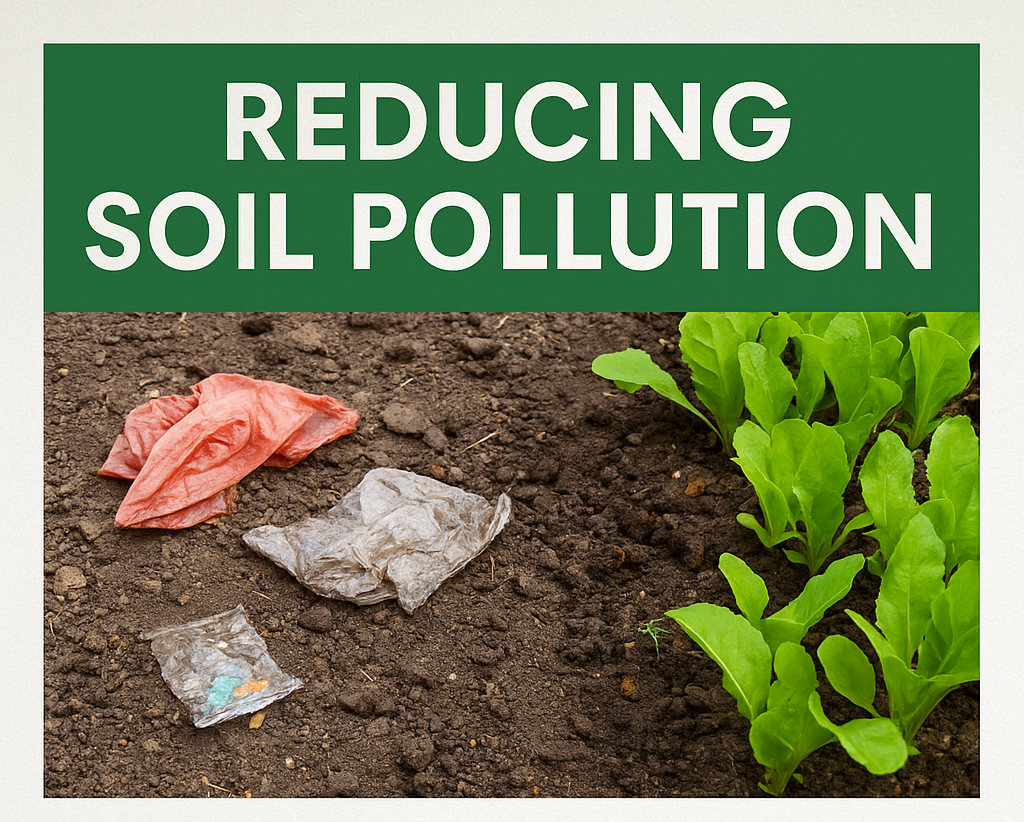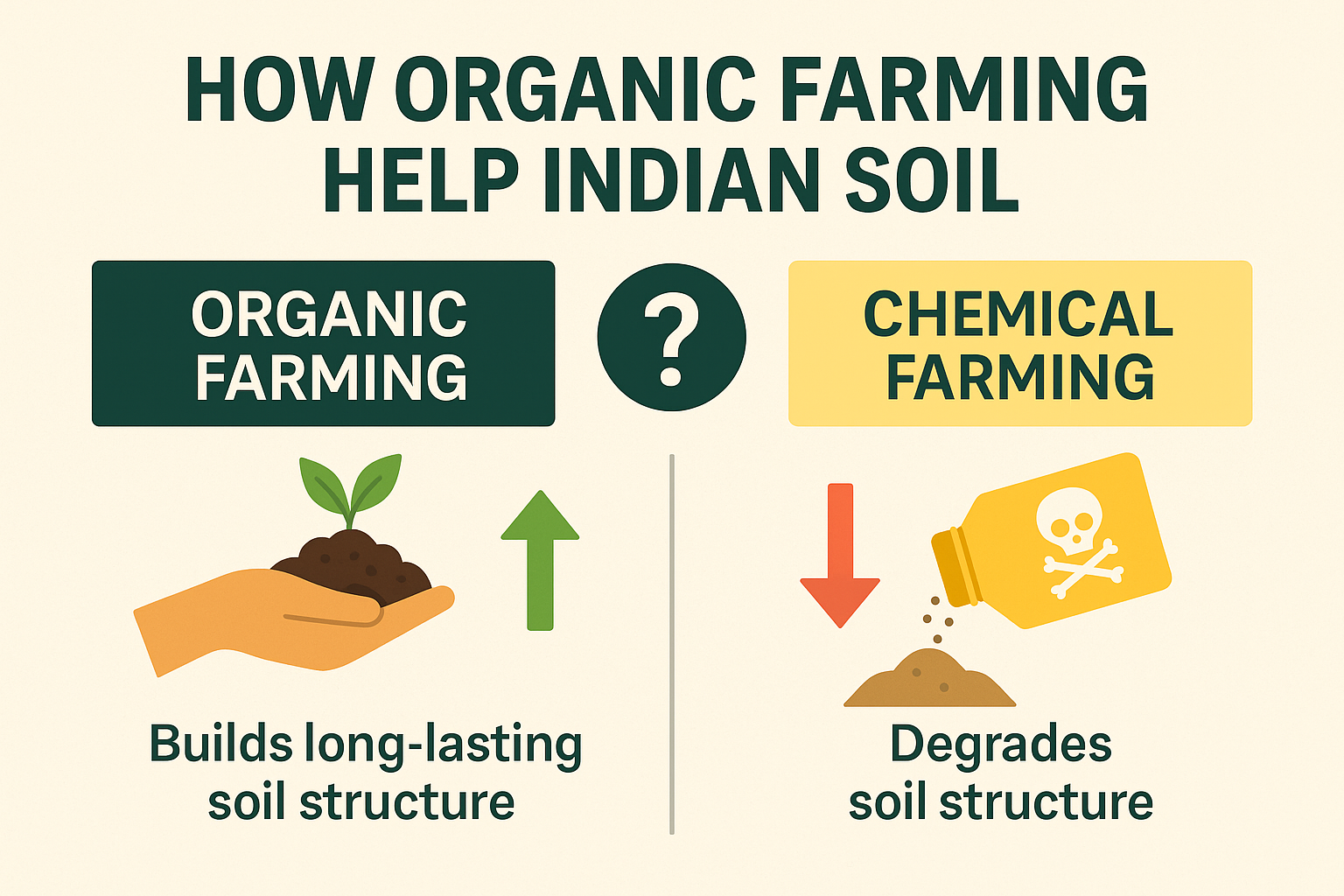
How Organic Farming Helps Indian Soil
Introduction: Nurturing Nature with Organic Farming
Best 10 Natural Solution to Reducing Soil Pollution in India’s agricultural heritage is deeply rooted in natural farming methods. Today, as environmental concerns grow, farmers are turning to organic practices to revive the land. One key benefit is reducing soil pollution, a major issue in modern farming.
best 10 natural solution to reducing soil pollution Organic farming ditches harmful chemicals and embraces compost, crop rotation, and biofertilizers. These techniques not only grow safer food but also enrich the soil. Healthy soil means healthier crops and communities. Let’s explore how organic farming protects Indian soil for future generations.
The Reality of Soil Pollution in India
Modern agriculture often depends heavily on synthetic fertilizers and pesticides. While these inputs may boost short-term crop yields, they harm the soil in the long run. Overuse of chemicals causes soil degradation, contamination, and a major decline in fertility. To tackle this problem, many farmers are now turning to the Best 10 Natural Solution to Reducing Soil Pollution.
The Government of India has acknowledged soil pollution as a pressing environmental concern. According to the Ministry of Agriculture, more than 30% of Indian soil exhibits signs of nutrient deficiency. Implementing the Best 10 Natural Solution to Reducing Soil Pollution can reverse this trend and restore soil health.
The Best 10 Natural Solution to Reducing Soil Pollution includes techniques like composting, green manuring, crop rotation, and the use of biofertilizers. These methods not only enrich the soil naturally but also reduce the need for harmful chemicals. The Best 10 Natural Solution to Reducing Soil Pollution also highlights vermicomposting, mulching, and organic mulches as powerful tools to preserve moisture and enhance microbial life.
Another practice from the Best 10 Natural Solution to Reducing Soil Pollution is the use of cover crops. These plants prevent erosion and help maintain nutrient levels. Agroforestry and natural pest repellents also form a vital part of the Best 10 Natural Solution to Reducing Soil Pollution strategy.
By adopting the Best 10 Natural Solution to Reducing Soil Pollution, farmers can improve yield quality while protecting the environment. Rural communities benefit through reduced input costs and healthier land.
In conclusion, the Best 10 Natural Solution to Reducing Soil Pollution offers a sustainable path for Indian agriculture. It’s time we shift to eco-friendly solutions that nourish our soil for future generations.
What is Organic Farming?
Organic farming is a natural method of cultivation that avoids synthetic chemicals. Instead, it uses compost, green manure, and biological pest control to grow crops. Among the Best 10 Natural Solution to Reducing Soil Pollution, organic farming holds a central place due to its eco-friendly approach.
The Best 10 Natural Solution to Reducing Soil Pollution emphasizes sustainable practices that improve soil health without harming the environment. Organic farming boosts microbial activity and enhances soil structure, making it one of the most effective techniques among the Best 10 Natural Solution to Reducing Soil Pollution.
By using natural inputs, farmers can avoid harmful residues and chemical buildup. This strategy, promoted through the Best 10 Natural Solution to Reducing Soil Pollution, supports long-term productivity and helps prevent land degradation.
The Best 10 Natural Solution to Reducing Soil Pollution also includes methods like green manuring, crop rotation, and vermicomposting—all of which are practiced under organic farming. These practices enhance nutrient content, reduce erosion, and support ecological balance.
Moisture retention and improved aeration are further benefits cited in the Best 10 Natural Solution to Reducing Soil Pollution. Organic mulch and cover crops, part of this solution set, contribute to better soil health and climate resilience.
In India, where soil pollution threatens food security, the Best 10 Natural Solution to Reducing Soil Pollution offers a sustainable way forward. Organic farming, as part of this strategy, empowers farmers to grow healthy food while preserving the land.
In conclusion, adopting organic farming as part of the Best 10 Natural Solution to Reducing Soil Pollution is not just a choice—it’s a necessity for India’s agricultural future.
Chemical Farming vs. Organic Farming: A Quick Comparison
| Aspect | Chemical Farming | Organic Farming |
|---|---|---|
| Fertilizers | Synthetic & chemical-based | Compost, green manure |
| Soil Health | Depletes over time | Improves with usage |
| Pollution Risk | High (chemical runoff) | Low |
| Crop Yield (short term) | Higher initially | Steady and sustainable |
| Cost (long term) | Increases due to input needs | Reduces with time |
As seen above, organic farming plays a major role in reducing soil pollution while preserving fertility for future crops.
How Organic Farming Reduces Soil Pollution
Organic farming practices restore soil integrity by eliminating harmful chemicals. Here’s how:
Compost and manure enrich the soil without toxins.
Crop rotation prevents pest buildup and maintains balance.
Green manures add nitrogen naturally to the soil.
Biopesticides control pests without harming soil organisms.
Mulching retains moisture and prevents erosion.
Each of these methods actively contributes to reducing soil pollution in Indian farms.
Benefits of Organic Farming on Indian Soil
Indian soil is rich but overworked. Organic farming revitalizes it through:
Improved water retention capacity.
Higher organic carbon levels.
Better microbial diversity.
Reduced erosion and compaction.
Greater nutrient availability.
These benefits make organic farming a natural ally in reducing soil pollution and reviving India’s farmlands.
Farmer Success Stories from India
Farmers across India are embracing organic farming and seeing remarkable results. For instance:
Sikkim became India’s first fully organic state in 2016.
Farmers in Andhra Pradesh report higher profits and better soil health.
Punjab is seeing a revival in natural farming through grassroots efforts.
Watch this inspiring transformation on YouTube.
Government Initiatives Promoting Organic Farming
The Indian government is promoting organic farming through multiple schemes:
Paramparagat Krishi Vikas Yojana (PKVY): Supports organic clusters.
National Mission for Sustainable Agriculture (NMSA): Encourages sustainable practices.
Zero Budget Natural Farming (ZBNF): Reduces cost of inputs.
Mission Organic Value Chain Development (MOVCD): Targets the Northeast.
These schemes help farmers in reducing soil pollution by shifting towards eco-friendly methods.
Impact on Indian Ecosystem
Soil is the foundation of agriculture and biodiversity. When soil is polluted, it affects food, water, and air quality. Organic farming rejuvenates the ecosystem by:
Protecting groundwater from chemical runoff.
Enhancing biodiversity underground and above.
Reducing greenhouse gas emissions.
Promoting pollinators like bees and butterflies.
Supporting sustainable livelihoods.
Clearly, reducing soil pollution helps more than just crops—it sustains life.
Common Organic Techniques Adopted in India
Panchagavya: A traditional mixture made from cow products.
Vermicomposting: Using earthworms to create rich compost.
Jeevamrut: A fermented microbial culture.
Intercropping: Growing complementary crops together.
Natural pest repellents: Neem, garlic sprays.
These techniques are simple, affordable, and effective in reducing soil pollution.
Role of Women in Organic Farming
In India, women are the unsung heroes of agriculture. Many women-led cooperatives have adopted organic farming, leading to healthier soil and empowered communities.
Women in Kerala run organic vegetable collectives.
In Maharashtra, self-help groups manage organic rice cultivation.
Their focus on sustainability directly aids in reducing soil pollution.
Challenges Faced by Organic Farmers
While organic farming has clear benefits, it comes with challenges:
Lack of awareness and training.
Initial lower yields.
Certification hurdles.
Limited market access.
Cost of transitioning.
However, these challenges are being addressed through community networks and government support for reducing soil pollution and improving farm sustainability.
Organic Farming and Indian Soil Types
India has diverse soils: black, red, laterite, alluvial, etc. Each type benefits from organic farming differently:
| Soil Type | Region | Organic Farming Benefit |
| Black Soil | Maharashtra, MP | Better moisture retention |
| Red Soil | Karnataka, Tamil Nadu | Enhanced fertility through compost |
| Alluvial | UP, Bihar, West Bengal | Improved structure, microbial balance |
| Laterite | Kerala, Odisha | pH stabilization, erosion control |
Custom organic practices ensure maximum benefit in reducing soil pollution across India.
Organic vs Inorganic: Long-term Perspective
While inorganic farming offers short-term gains, organic farming secures long-term soil health:
Soil texture improves over time.
Organic matter increases annually.
Pest resistance becomes natural.
Soil life flourishes.
Yields stabilize sustainably.
Thus, organic farming becomes a powerful tool in reducing soil pollution for future generations.
What Indian Consumers Can Do
You play a big role too! Supporting organic products encourages farmers to continue eco-friendly practices. Here’s how:
Buy from certified organic brands.
Visit local organic markets.
Learn about farm-to-table sourcing.
Spread awareness in your community.
Support farmers using eco-friendly methods.
Together, we can ensure a movement focused on reducing soil pollution.
Call to Action: Support Soil, Support Life
Every action toward organic farming is a step toward healthier soil and safer food. Whether you’re a farmer or a consumer, your choices matter. Let’s commit to reducing soil pollution and protecting India’s agricultural legacy.
Have questions or want to start your organic journey? Contact Us to learn more and get guidance.
Conclusion: The Future is Organic
best 10 natural solution to reducing soil pollition in India stands at a critical agricultural crossroads. With increasing soil degradation, the need for change is urgent. Organic farming offers a sustainable path forward by reducing soil pollution, improving soil health, and securing the future of farming.
Soil pollution is silently damaging our farms, food, and future. But the good news? The Best 10 Natural Solution to Reducing Soil Pollution can help bring back soil health without harming the environment. Indian farmers and landowners are now turning to natural ways to heal the earth and increase productivity.
The Best 10 Natural Solution to Reducing Soil Pollution includes simple yet powerful practices like crop rotation, composting, green manure, mulching, and cover cropping. These not only prevent chemical buildup but also enrich the soil with essential nutrients.
Another key part of the Best 10 Natural Solution to Reducing Soil Pollution is the use of biofertilizers and organic inputs. These replace harmful synthetic chemicals and help grow healthier crops. Techniques like vermicomposting and natural pest repellents also fall under these eco-friendly solutions.
Community farming practices, like organic farming cooperatives, are also part of the Best 10 Natural Solution to Reducing Soil Pollution. When small farmers join hands and follow these methods, they not only save money but also restore their land.
Why is this important now? Because the Best 10 Natural Solution to Reducing Soil Pollution supports long-term sustainability. Healthy soil means better crops, safe food, and a cleaner environment for future generations.
By following the Best 10 Natural Solution to Reducing Soil Pollution, we can reverse the damage caused by years of chemical farming. It’s time to go back to our roots—literally—and protect our soil with nature’s best tools.
Add Your Heading Text Here

What is the main reason why people ask how organic farming help Indian soil?
Many people are concerned about soil pollution from chemical fertilizers. When we ask how organic farming help Indian soil, the answer lies in its natural techniques that enrich soil health without harmful chemicals.
Does organic farming really improve soil fertility in India?
Yes! One major way how organic farming help Indian soil is by increasing the organic matter in the soil, which improves water retention, microbial activity, and long-term fertility.
How organic farming help Indian soil compared to chemical farming?
Unlike chemical farming, organic methods like composting, crop rotation, and bio-fertilizers reduce pollution and build long-lasting soil structure. This is a key point in how organic farming help Indian soil sustainably
Are Indian farmers seeing results from organic practices?
Absolutely. Thousands of Indian farmers report better yields over time and richer soil. This is proof of how organic farming help Indian soil through natural balance and healthy ecosystems.
Can organic farming reverse damage to Indian soil?I
Yes, gradually. One reason how organic farming help Indian soil is that it detoxifies soil layers, restores microbial life, and prevents erosion — crucial for reversing decades of chemical damage
